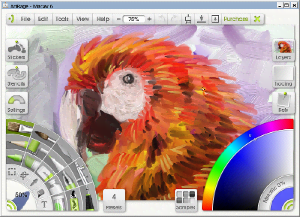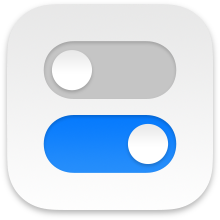
A graphical user interface, or GUI, is a form of user interface that allows users to interact with electronic devices through graphical icons and visual indicators such as secondary notation. In many applications, GUIs are used instead of text-based UIs, which are based on typed command labels or text navigation. GUIs were introduced in reaction to the perceived steep learning curve of command-line interfaces (CLIs), which require commands to be typed on a computer keyboard.

ArtRage is a bitmap graphics editor for digital painting created by Ambient Design Ltd. It is currently in version 6, and supports Windows, macOS and mobile Apple and Android devices and is available in multiple languages. It caters to all ages and skill levels, from children to professional artists. ArtRage 5 was announced in January 2017 and released in February 2017.

The iPod Touch is a discontinued line of iOS-based mobile devices designed and formerly marketed by Apple Inc. with a touchscreen-controlled user interface. As with other iPod models, the iPod Touch can be used as a portable media player and a handheld gaming device, but can also be used as a digital camera, a web browser, for email and messaging. It is nearly identical in design to the iPhone, and can run most iPhone third-party apps from the App Store, but it connects to the Internet only through Wi-Fi and uses no cellular network data, as it lacks a cellular modem.
3DVIA is a brand of Dassault Systèmes that is focused on the development of 3D authoring, publishing, and hosting tools for professional and consumer markets. The company's products are targeted at manufacturing, design, and marketing professionals.

iOS is a mobile operating system developed by Apple exclusively for its devices. It was unveiled in January 2007 for the first-generation iPhone, which launched in June 2007. Major versions of iOS are released annually; the current stable version, iOS 18, was released to the public on September 16, 2024.
iOS is a mobile operating system developed by Apple Inc. and was first released as iPhone OS in June 2007, coinciding with the launch of the first generation iPhone. iPhone OS was renamed iOS following the release of the iPad, starting with iOS 4. With iOS 13, Apple began offering a separate operating system, iPadOS, for the iPad. iOS is also the foundation of the newer audioOS and tvOS, and shares some of its code with macOS. New iOS versions are released yearly, alongside new iPhone models. From the launch of the iPhone in 2007 until the launch of iPhone 4 in 2010, this occurred in June or July; since then, new major versions are usually released in September, with the exception of iOS 5, which released in October 2011. Since the launch of the iPhone in June 2007, there have been 18 major releases of iOS, with the current major version being iOS 18, released on September 16, 2024.
iOS jailbreaking is the use of a privilege escalation exploit to remove software restrictions imposed by Apple on devices running iOS and iOS-based operating systems. It is typically done through a series of kernel patches. A jailbroken device typically permits root access within the operating system and provides the right to install software unavailable through the App Store. Different devices and versions are exploited with a variety of tools. Apple views jailbreaking as a violation of the end-user license agreement and strongly cautions device owners not to try to achieve root access through the exploitation of vulnerabilities.

The iPad is a brand of iOS- and iPadOS-based tablet computers that are developed and marketed by Apple. The first-generation iPad was introduced on January 27, 2010. Since then, the iPad product line has been expanded to include the smaller iPad Mini, the lighter and thinner iPad Air, and the flagship iPad Pro models. As of 2022, over 670 million iPads have been sold, making Apple the largest vendor of tablet computers. Due to its popularity, the term "iPad" is sometimes used as a generic name for tablet computers.

The Apple A4 is a 32-bit package on package (PoP) system on a chip (SoC) designed by Apple Inc., part of the Apple silicon series, and manufactured by Samsung. It was the first SoC Apple designed in-house. The first product to feature the A4 was the first-generation iPad, followed by the iPhone 4, fourth-generation iPod Touch, and second-generation Apple TV.

FaceTime is a proprietary videotelephony product developed by Apple Inc. FaceTime is available on supported iOS mobile devices running iOS 4 and later and Mac computers that run Mac OS X 10.6.6 and later. FaceTime supports any iOS device with a forward-facing camera and any Mac computer equipped with a FaceTime Camera. FaceTime Audio, an audio-only version, is available on any iOS device that supports iOS 7 or newer, and any Mac with a forward-facing camera running OS X 10.9.2 and later.

The iPad 2 is a tablet developed and marketed by Apple Inc. Compared to the first iPad, as the second model in the iPad line, it gained a faster dual core A5 processor, a lighter build structure with a flat, rather than curved, back, and was the first iPad to feature VGA front-facing and 720p rear-facing cameras designed for FaceTime video calling.

Mono is a free and open-source software framework that aims to run software made for the .NET Framework on Linux and other OSes. Originally by Ximian which was acquired by Novell, it was later developed by Xamarin which was acquired by Microsoft. In August 2024, Microsoft transferred ownership of Mono to WineHQ.
The following outline of Apple Inc. is a topical guide to the products, history, retail stores, corporate acquisitions, and personnel under the purview of the American multinational corporation:
The iPad Mini is a line of small tablet computers developed and marketed by Apple Inc. It is a sub-series of the iPad line of tablets, with screen sizes of 7.9 inches and 8.3 inches. The first-generation iPad Mini was announced on October 23, 2012, and was released on November 2, 2012, in nearly all of Apple's markets. It featured similar internal specifications to the iPad 2, including its display resolution.
Fireproof Studios Ltd is a British video game art studio based in Guildford, England, and founded in September 2008. Fireproof Games, a division of the company, acts as video game developer. The company is best known for its The Room series of puzzle video games, of which the first, The Room (2012), was named "Best British Game" at the 2013 British Academy Games Awards, and sold over two million copies as of May 2013.

Control Center is a feature of Apple Inc.'s iOS, iPadOS, macOS, and visionOS operating systems. It was introduced as part of iOS 7, released on September 18, 2013. In iOS 7, it replaces the control pages found in previous versions. It gives iOS and iPadOS devices direct access to important settings for the device by swiping down from the top right corner on the iPhone X and newer, and on all iPad models starting with iOS 12 or iPadOS, with previous models using a swipe from the bottom of the screen. It is similar to the SBSettings tweak for iOS jailbreaking. Control Center was also added to Macs in macOS 11 Big Sur, released on November 12, 2020.

The iPad Mini 2 is a tablet computer designed and marketed by Apple Inc. It has a nearly identical design to its predecessor, the first-generation iPad Mini, but features internal revisions such as the use of an A7 system-on-a-chip and a 2,048 x 1,536 resolution Retina Display. Internally, the second-generation iPad Mini has nearly the same hardware as its sibling device, the iPad Air. Apple released the second-generation iPad Mini in space gray and silver colors on November 12, 2013.

The iPad Mini, known retrospectively as the iPad Mini 1, is the first generation of the mini tablet computer developed and marketed by Apple Inc. It was announced on October 23, 2012, as the fourth major product in the iPad line and the first of the iPad Mini line. It features a reduced screen size of 7.9 inches (20 cm), compared to the 9.7-inch (25 cm) display on standard iPads at that time.

The fifth generation iPod Touch is a mobile device designed and marketed by Apple Inc. with a touchscreen-based user interface. The successor to the 4th-generation iPod Touch, it was unveiled at Apple's media event alongside the iPhone 5 on September 12, 2012, and was released on October 11, 2012. It is compatible with up to iOS 9.3.5, which was released on August 25, 2016.

The iPad Air 2 is the second-generation iPad Air tablet computer developed and marketed by Apple Inc. It was announced on October 16, 2014, alongside the iPad Mini 3, both of which were released on October 22, 2014. The iPad Air 2 is thinner, lighter and faster than its predecessor, the first-generation iPad Air, and features Touch ID with the height, width and screen size the same as the iPad Air.













